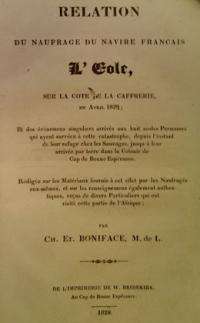Lost tale of a forgotten shipwreck discovered

A lost book, revealing the story of a forgotten shipwreck, has been discovered by an expert at the University of St Andrews.
Dr. David Culpin, Reader in the Department of French at the University of St Andrews, found the text while studying the books owned by a 19th century governor of Cape Colony before it became Cape Town.
The lost book tells the tale of the Eole, a merchant vessel, that sank off the coast of Africa, and of its eight survivors who walked for three weeks barefoot to safety, encountering the indigenous population at a time when an uneasy peace existed between them and the European settlers.
There are just seven known copies in the world of the book, which is written in French and is based on an account that was provided by the survivors themselves.
The 124 page text, written by Charles-Etienne Boniface, is believed to be the first book in French and the first travel narrative to have been published in South Africa.
The Eole, a trading vessel, left Bordeaux in France for Calcutta but was wrecked after leaving Réunion island on its return passage, in April 1829, on a wild section of the African coast, beyond the eastern frontier of the Colony.
Just eight of the 20 passengers and crew survived and spent three days with the indigenous Xhosa people before their arduous trek across rough terrain to reach the nearest European settlement.
Against a backdrop of great unrest along the frontier between the Xhosa and the European settlers they emerged to the nearest European settlement to be met by a Major Dundas sparking speculation he may have been a Scottish soldier.
Dr. Culpin believes the text is important because of the unique description it provides of contemporary events in Southern Africa. He said: “Travel literature was very popular in the early 19th century, but only about seven per cent of travel narratives published at that time describe Africa, and even fewer give any description of interaction between Europeans and the indigenous people.
“The text offers an eyewitness account of contemporary Cape Town, and describes places like Grahamstown and Port Elizabeth just a few years after these settlements had been established.”
He added: “The author is also a very interesting character: as a young child he fled with his family from Paris during the French Revolution, and subsequently became an important figure in the literary life of the Cape.
“In 1832 he wrote a play satirizing the local temperance movement, which is one of the earliest texts to use the Afrikaans language.”
Dr. Culpin believes no more than 200 copies would have been printed and many would not have survived because they were sold unbound. The book probably also attracted little attention because Boniface was writing in French in an English and Dutch-speaking colony, and therefore appealing to a limited readership.
Dr. Culpin discovered the book while studying the French books collected by Sir George Grey, who was governor of Cape Colony between 1854 and 1861.
Provided by University of St Andrews



















